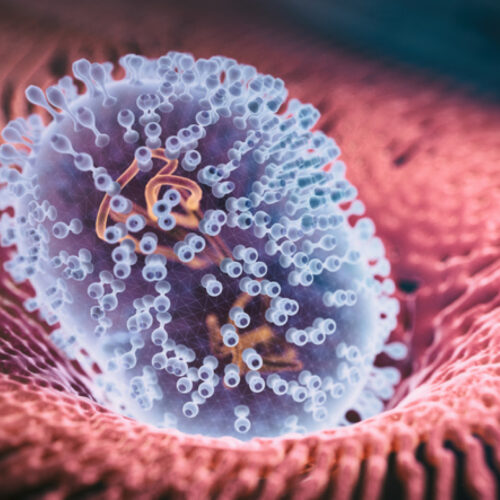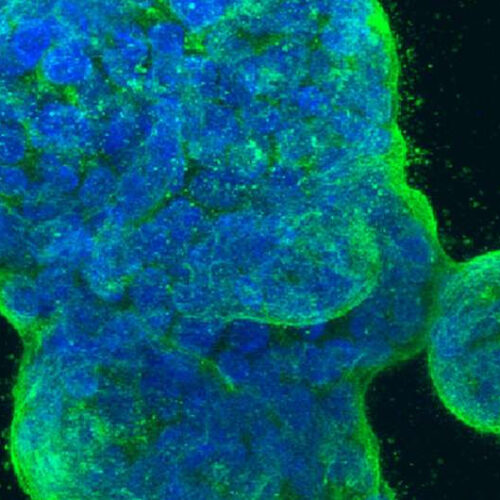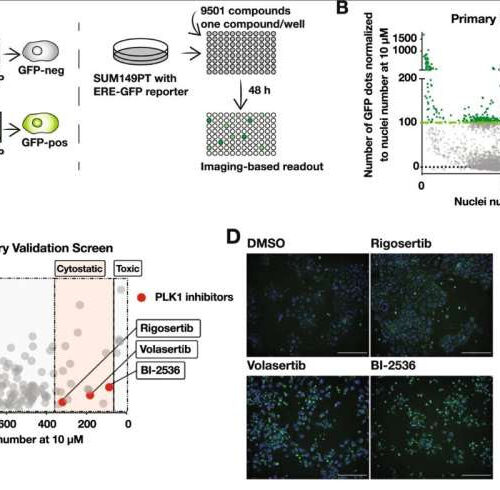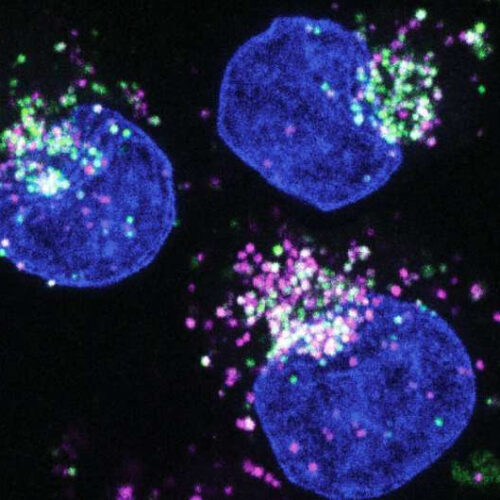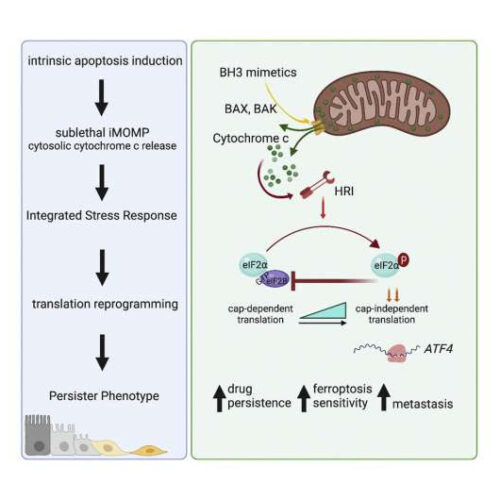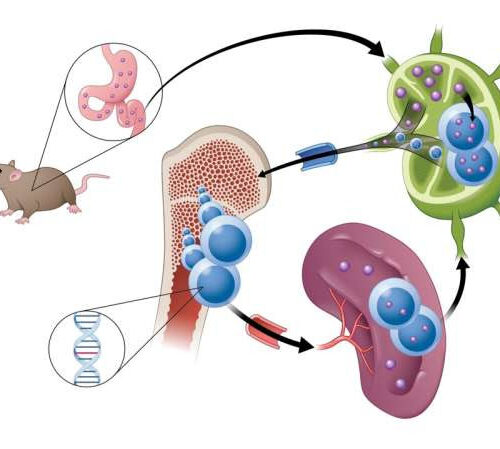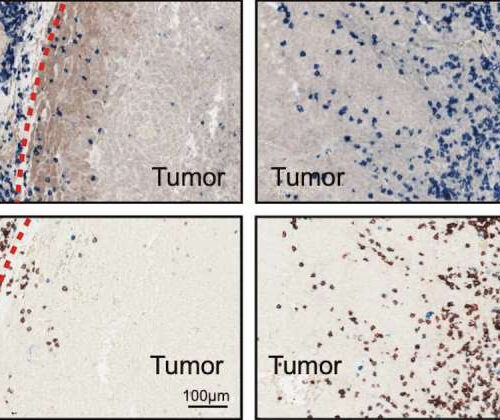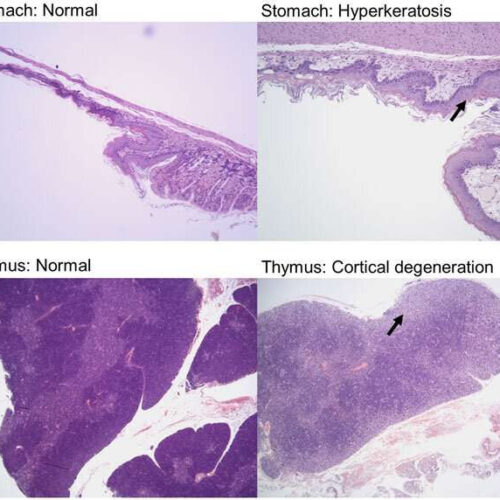A genetically modified version of the herpes virus has shown great potential in treating advanced cancers, according to a report by the Institute of Cancer Research in London published on Thursday. A promising therapy Although the treatment is still in early trials, researchers have found that RP2, a modified version of the herpes simplex virus,...
Tag: <span>cancer cells</span>
Keeping aggressive cancer cells in check by blocking a protein responsible for repairs
by Catarina Pietschmann, Max Delbrück Center for Molecular Medicine Three-dimensional culture of human breast cancer cells, with DNA stained blue and a protein in the cell surface membrane stained green. Credit: NCI Center for Cancer Research, National Cancer Institute, National Institutes of Health Every cell has two mechanisms for repairing DNA single- or double-strand breaks, which...
Researchers turn cancer cells into less harmful cell types
by University of Basel High-throughput drug screen reveals estrogen receptor α (ERα) induction in triple-negative breast cancer (TNBC) upon polo-like kinase 1 (PLK1) inhibition. A Schematic of the high-throughput drug screen to identify inhibitors that induce ERα signaling in TNBC. Cells without active ERα signaling do not express GFP, whereas cells with active ERα signaling...
Breaking down proteins: How starving cancer cells switch food sources
by German Cancer Research Center Human cancer cells (cell nucleus in blue) feeding on protein (Albumin, labeled in green). The proteins are digested and broken down into amino acids in the lysosomes (magenta). Credit: W. Palm / DKFZ Cancer cells often grow in environments that are low in nutrients, and they cope with this challenge...
Examining how some cancer cells cheat treatment-induced cell death
by St. Jude Children’s Research Hospital Graphic abstract. Credit: Cell (2022). DOI: 10.1016/j.cell.2022.07.025 Scientists at St. Jude Children’s Research Hospital have identified how some cancer cells cheat treatment-induced cell death. In doing so, they persist and lead to cancer recurrence. The findings may serve as the basis for drugs that prevent relapses by inhibiting cancer cells from...
New drug candidate uses novel absorption method to target cancer cells in mice
by University of Michigan A model demonstrating how this type of novel drug is absorbed through the lymphatic system. Credit: Danielle Dobbs/Michigan Medicine A team of University of Michigan researchers is developing a new anti-cancer drug that is absorbed through the gut’s lymphatic system rather than blood vessels, potentially outmaneuvering the molecular signaling pathways that...
LOCUSTS CAN ‘SMELL’ HUMAN CANCER CELLS
However, patients need not worry about locusts swarming their doctors’ offices. Rather, the researchers say this work could provide the basis for devices that use insect sensory neurons to enable the early detection of cancer using only a patient’s breath. “NOSES ARE STILL STATE OF THE ART. THERE’S REALLY NOTHING LIKE THEM WHEN IT COMES...
Cancer cells selectively load ‘drones’ to keep T cells from infiltrating tumors
by Katherine Unger Baillie, University of Pennsylvania Researchers found a mechanism by which cancers keep T cells from infiltrating tumors. In areas of a tumor with low levels of a molecule called HRS with a phosphate group added, T cells could penetrate (right panels), but they were nearly blocked in areas with high levels of...
How different cancer cells respond to drug-delivering nanoparticles
The findings of a large-scale screen could help researchers design nanoparticles that target specific types of cancer. Using nanoparticles to deliver cancer drugs offers a way to hit tumors with large doses of drugs while avoiding the harmful side effects that often come with chemotherapy. However, only a handful of nanoparticle-based cancer drugs have been FDA-approved. A...
Researchers test drug combination as means to prevent drug resistance in cancer cells
by Leslie Cantu, Medical University of South Carolina Histopathology representative images of stomach hyperkeratosis and thymus cortical degeneration. (A) H&E stained images of stomach sections from a vehicle control mouse (left panel) and a Doxil treated mouse (right panel). Images shown at ×10 magnification. Arrow highlights hyperkeratosis. (B) H&E stained images of thymus sections from...

